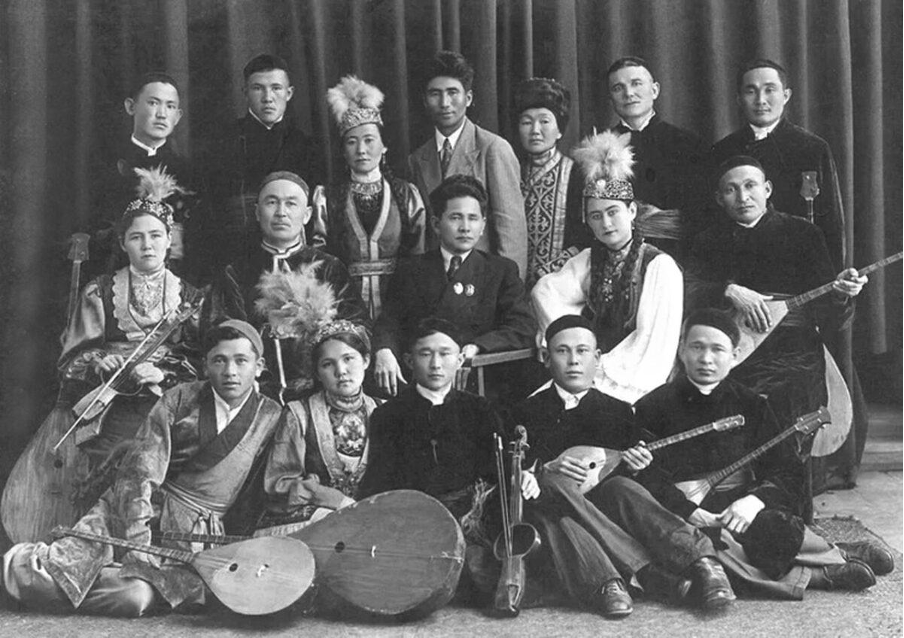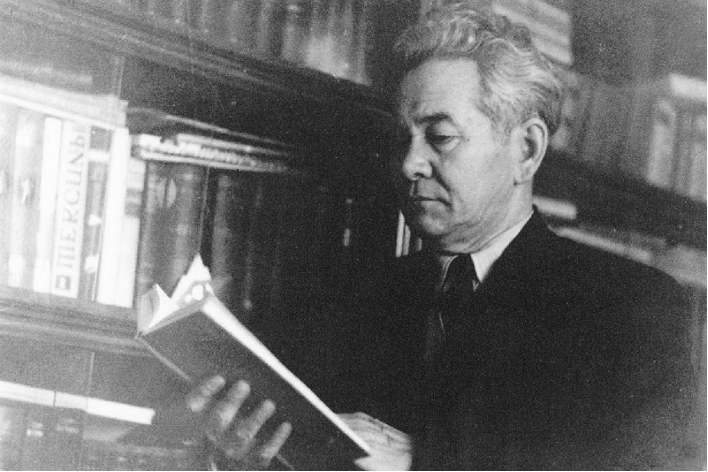Akhmet Zhubanov is the musicologist, composer, conductor, People’s Artist of the Kazakh SSR, academician of the Academy of Sciences of the Kazakh SSR. He is one of the first authors of music for Kazakh plays and films. Also, he is known as an ethnographic researcher of the Kazakh folk songs and kyuis, as well as a writer and historian.
The composer was born on April 29, 1906 in the Kosuaktam landscape unit, currently, the Aktobe region. Zhubanov’s father dreamed of educating his children. He put a lot of effort into opening a school in his village, where he took seven-year-old Akhmet. In 1918, Zhubanov graduated from a two-year Russian school and then, after studying at teacher training courses, worked in the city of Temir. At the same time, the young man did not forget about music for a minute, independently studying theory and musical literacy, as well as playing in an amateur orchestra of folk instruments.
In 1919-1928, working as a secretary of the village council and a teacher, he took the lessons in solfeggio, music theory and violin playing from the Head of the orchestra of Russian folk instruments P. Chernyak.
It is worth noting that Zhubanov was greatly impressed by A.V.Zataevich’s book “1,000 Songs of the Kazakh people”, which was published at that time.
“I learned a lot of all kinds of legends about the songs collected by Zataevich, and about a man who could read these mouse-like footprints, the outlines of sounds and was eager to become the same specialist in the field of music as Zataevich. Chernyuk warmly and sincerely supported this aspiration of mine. My absentee acquaintance with A.V. Zataevich through his collection of Kazakh songs decided the direction of my future fate by 90 percent”, - the composer recalled later.
In 1928, Akhmet became a student at the M.I. Glinka Music College in Leningrad, where he studied violin with an experienced teacher A. A. Etygon. The time of intensive study began, but the young man was not limited only to the secondary school program, making a lot of efforts to enter the conservatory. Subsequently, the talented musician was enrolled in the Leningrad Conservatory at the oboe class.
In 1932, Zhubanov became a graduate student at the Academy of Art History in Leningrad, and a year later, he was recalled to work in Alma-Ata. His entire subsequent creative life turned out to be closely connected with the origin, formation and development of the new forms of musical culture in Kazakhstan. Zhubanov’s organizational and pedagogical activities began in the 30s, when the first musical educational institution was opened in the country, as the Music and Drama College. At the initiative of Zhubanov, a scientific cabinet was organized under him, as well as an experimental workshop for improving the folk instruments. Y. Brusilovsky from Leningrad, L. Mukhitov from the Ural region, M. Bukeikhanov from Kyzyl-Orda, the Romanenko brothers, masters of musical instrument making and others were invited to work here.

Akhmet Zhubanov and ensemble of folk instruments
At the Music and Drama College, Zhubanov created a student ensemble of folk instruments, which demonstrated its art at the First All-Kazakhstan Gathering of Folk Talents in 1934. Soon, the Presidium of the Kazakh Central Executive Committee adopted a resolution for the creation of Kazakh national instruments on the basis of an ensemble – orchestra. This is how the world-famous Kurmangazy Kazakh State Orchestra of Folk Instruments came into existence, the conductor and artistic director of which was appointed Akhmet Zhubanov.

An important aspect of Zhubanov’s fruitful activity is his organizational work on training the national personnel. For many years, he headed the Department of Kazakh Folk Instruments of the Alma-Ata State Conservatory, where he developed a special course on the history of Kazakh folk music. At present, many of the famous musicians are graduates of Akhmet Zhubanov. These are Nurgisa Tilendiyev, Shamgon Kazgaliyev, Rustembek Omarov and others.
Zhubanov successfully combined his research, musical, social and pedagogical activities with active creativity, making a great contribution to Kazakh professional music. He is the author of many works of various genres that have been recognized by the people. The symphonic works and operas, chamber instrumental and choral compositions, songs and romances, music for the dramatic performances and films are among them. Since 1938, Akhmet Zhubanov had been actively engaged in composing.
The young composer did not limit himself to remaking the Kazakh folk songs. He arranged the compositions by the Russian and foreign classical composers for the orchestra of Kazakh folk instruments. In 1943, the Kazakh Orchestra of Folk Instruments played the march of Chernomor from Glinka’s opera “Ruslan and Lyudmila”, Schubert’s “Musical Moment” in Zhubanov’s instrumentation. Subsequently, the orchestration of fragments of Tchaikovsky’s opera “The Queen of Spades”, Rimsky-Korsakov’s “The Tsar’s Bride”, “Preludes” and “Crimean Sketches” by Alexander Spendiyarov were created as well. Also, Akhmet Zhubanov arranged the instrumental compositions, songs and choirs by Koval, Pokrassov, Chishko, Revutsky and other Russian and Ukrainian composers of the Soviet period for the orchestra. All this contributed to the improvement and improvement of the performing skills of the orchestra’s musicians. The further growth of this collective and wide promotion of the work of classical composers is inseparable from the activities and experience of Zhubanov. His traditions became an example for the subsequent generations of composers and conductors.
In 1938-40, Zhubanov’s compositional activity developed in two directions — he was involved in processing the folk songs, kyuis and wrote his own works. In 1939, he created music for the “Kozy-Korpesh — Bayan-Sulu” stage play by G. M.Musirepov. Along with the composer M.F. Gnessin, he was working on the music for the “Amangeldy” film. Then, he composed music for the dramatic performances of M. Akynzhanov “Isatai-Makhambet”, M.O. Auezov “Abai”. One of the significant creations of these years is the “Sarah” musical play about the life and work of a folk composer.
Zhubanov came to writing the major musical compositions with a great deal of creative baggage, having drawn from the treasury of folk heritage those works which, in his opinion, sounded most successfully in the orchestra without losing their colours. Thus, the music written for the “Abai” tragedy by Mukhtar Auezov and the “Abai” symphonic poem were the preparatory stage for writing an opera on this topic. The “Abai” opera, written by Zhubanov in creative collaboration with composer Latif Khamidi in 1944, became the first pen test in this genre. The “Abai” opera, written for the 100th anniversary of the birth of Abai Kunanbayev and dedicated to the 10th anniversary of the opening of the Kazakh Opera and Ballet Theater, has become a new word in Kazakh music.
It is enough to try only to imagine the entire creative life of Akhmet Zhubanov, as involuntarily surprise at his colossal efficiency and diligence covers. He had written the hundreds of research papers, articles and art essays on national musical culture. Zhubanov’s works such as “Strings of Centuries”, “Nightingales of Centuries”, “Kurmangazy”, “Life and Work of Kazakh Folk Composers”, “Music culture of Kazakh people”, “An kyui sapary” (“Journey through Songs and Kazakh national compositions”) can be found in the home library of any researcher interested in folk music. Zhubanov’s works have long been a necessary source for the literary work. Akhmet Zhubanov, who “jealously guarded the legacy of folk music until the last day of his life, even for a moment, could not stop thinking about his fate, the fate of the music, which has become the ideal of his life”.
A great Kazakh composer Akhmet Zhubanov passed away on May 30, 1968. He was buried in the central cemetery of Almaty.




